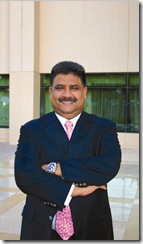Deepening of the competitive landscape in Afghanistan over the past few years has meant that Roshan has had to work harder to stake its claim to be the country’s most popular mobile provider. Roshan CEO Karim Khoja describes how customer retention is the absolute name of the game and how satisfying a subscriber at a time is likely to keep the operator in pole position
Khoja intends to keep Roshan ticking over through a combination of tight cost control and churn-limiting strategies
Churn is a huge issue within Afghanistan’s mobile telecom space, Karim Khoja acknowledges, and as such the mobile operator’s primary focus is on the retention of large portions of its overall subscriber base.
“We have programmes such as on-net incentives extended to friends and families of subscribers in order to keep our users on our network,” says Khoja. “We are very aggressive with this kind of thing. We are data analysis driven, customer relationship management (CRM)-focussed, and benefit from being part of the Vodafone Partner Programme,” he adds.
Roshan was one of the first mobile operators in the country to recognise loyalty and reward it with a points-based system of incentives. Khoja says the cellco’s corporate social responsibility (CSR) activities also drive appreciation and stickiness to the brand.
Five mobile operators exist in Afghanistan today, with two competitors – Etisalat Afghanistan and MTN Afghanistan – backed by well-established international players. Afghan Telecom operates a CDMA network while Afghan Wireless is the country’s fifth network operator.
Roshan claims 38 per cent market share, and Khoja is quick to point out this refers to the operator’s active subscribers, not the number of SIM cards it has in circulation. “We have five million active customers, and maybe as many as 12 million SIM cards in the market,” says Khoja. The operator is targeting a 40 per cent market share by the end of 2012, and Khoja claims this can be achieved as the cellco continues to be run profitably.
“A couple of our competitors are really throwing money around,” says Khoja. “Our staff is often poached by our competitors, offering three or four times more than what they receive with us, but I am not sure this approach will result in the running of profitable businesses.”
Towards the end of Q111, UAE operator Etisalat said its operation in Afghanistan had attracted almost three million customers across 27 provinces, equating to 24 per cent market share, according to CEO Saeed Al Hamili.
“We have invested directly or indirectly US$300 million in Afghanistan and around 10,000 Afghans are supported by us and our distribution partners. We will continue to reach more areas of Afghanistan and introduce more voice and data services,” Al Hamili said.
For the quarter ended March 31, 2011, MTN reported that its operator in Afghanistan counted 4.189 million subscribers, up from 4.045 million at the end of December 2010, up 3.6 per cent.
Since launching in 2007, Etisalat’s network has reached approximately 90 per cent of Afghanistan, despite the security issues and geographical conditions.
As Roshan is forced to recruit new employees from universities, Khoja believes this is actually having a positive effect on the quality of the operator’s staff given the quality of candidates graduating from universities in the Afghanistan at this point in time. 
In November 2008, Roshan partnered with Vodafone to launch M-Paisa, the country’s first mobile banking product
Apart from training staff rigorously, another area of differentiation Roshan is keen to maintain is in the segmentation of its subscriber base. The operator has targeted offers for the youth segment, business users and women, for example, and has been hard at work forging deeper relationships within each of the defined groups.
“Before we began this segmentation strategy, women accounted for around 8-9 per cent of our customer base,” reveals Khoja. “Now they account for around 18 per cent, with approximately 30 per cent of new subscribers coming on to our network being women.”
Roshan’s network is fully GPRS nationwide, and even in Afghanistan there is a small though active BlackBerry-savvy community. Khoja is under the impression that a licensing process for 3G spectrum is likely to take place next year, though an overriding problem remains the lack of backbone infrastructure in the country.
Security threats remain another problem in Afghanistan, with Khoja stating that the situation has become worse rather than having improved. With Roshan alone contributing between 6-7 per cent of Afghanistan’s total tax revenues annually, and the telecom sector in general contributing 14-15 per cent, this area of the economy attracts the attention of those who aim to destabilise the country.
In the face of such challenges, and with the Aga Khan Fund for Economic Development (AKFED) as a majority shareholder in Roshan, developmental issues are high on the agenda of the mobile operator as it goes about conducting its business. In November 2008, Roshan partnered with Vodafone to launch M-Paisa, the country’s first mobile banking product. M-Paisa provided consumers, businesses, local banks and employers with an accessible, cost effective and safe method for funds transfer, airtime refill, salary payment, microfinance transactions and cashless travel.
“M-Paisa has the potential to boost economic growth through the elimination of common financial barriers, especially in remote areas and in particular to women, who often are the sole supporters of the family,” commented Roshan’s chief operating officer Altaf Ladak at the end time of the M-Paisa launch. “Through M-Paisa and Roshan’s mobile network coverage, we provide an important vehicle for the economic regeneration of Afghanistan,” he added.
Such economic regeneration has seen Roshan successfully complete a pilot programme by which 250 policemen were paid their wages in a timely fashion, with the project since having been extended to encompass the payment of 4,000 policemen in total.
Currently, Vodafone’s M-Paisa/M-Pesa has over 22 million customers internationally. Through a salary disbursement programme for the public and private sector, as well as an extensive agent network throughout the country, M-Paisa in Afghanistan facilitates growth of an ecosystem for the transparent movement of money nationwide. 
Roshan has targeted offers for the youth segment, business users, and women, for example, and has been hard at work forging deeper relationships within each of the defined groups
At the end of April 2011, Afghanistan’s central bank announced the issuance of Afghanistan’s first electronic money institution (EMI) licence to M-Paisa. The EMI licensing process was recently introduced to better serve the growing demand for mobile money services in Afghanistan. In effect, the EMI licence is set to complement the existing Money Service Provider (MSP) licence in setting the standard for mobile money service providers in Afghanistan, and ensure that customers, agents and partners are further protected.
Mobile penetration in Afghanistan is estimated at around 35 per cent, with a total addressable market in the region of 20-25 million users, out of a population that is forecast to rise to 65 million by 2050. Thus Khoja believes there is no reason for the operator to cannibalise its base, though he also acknowledges that price has become the driver of the market.
Roshan’s constant review of the cost side of the business means that OPEX has remained flat over the past two years, though Khoja says improvements are to be made to Roshan’s ERP system, which he would like to see updated using SAP solutions.
Roshan’s network suppliers are Huawei and Nokia Siemens Networks, which Khoja believes is a good balance of cost effectiveness, quality and experience.
“CAPEX per subscriber has fallen significantly since we engaged Huawei, and such developments are important in our bid to keep our costs under control,” says Khoja.
Challenges remain apparent and significant in Afghanistan, though Khoja is of the opinion that his company is on the right path and that its commitment not just to return value to shareholders but also to assist rebuilding the country will set it in good stead.





0 comments ↓
There are no comments yet...Kick things off by filling out the form below.
Leave a Comment